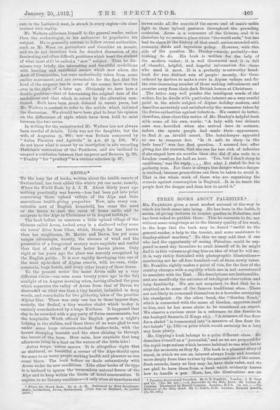AROSA.*
To the long list of books, written about the health resorts of Switzerland, has been added this winter yet one more, namely, Where the World Ends, by A. A. H. About thirty years ago nothing practically was known—less had been put into print concerning those upland valleys of the Alps and their marvellous health-giving properties. Now, into every con- ceivable sort of English household, has come the need or the desire to cast the cares of home aside, and to emigrate to the Alps in Christmas or in August holidays.
The book 'before us concerns a little upland village of the Orisons called Arosa, tucked away in a sheltered valley some six hours' drive from Chur, which, though far less known than her neighbours, St. 'Moritz and Davos, has yet some unique advantages, namely, the absence of wind and the possession of a foreground scenery more exquisite and restful than that of either of those better known places. Only eight or ten years ago the place was scarcely recognized by the English public. It is now rapidly developing into one of the most up-to-date of Alpine resorts, with ice-runs, rinks sanatoria, huge hotels, and every other luxury of these times.
To the present writer the name Arosa calls up a very different vision—one seen some twenty years ago in the full sunlight of an August morning when, having climbed the pass which separates the valley of Arosa from that of Davos, we descended on what was then a tiny hamlet, imbedded in deep woods, and remarkable for two glittering lakes of the peculiar Alpine blue. There was only one inn in those bygone days, namely, the Seehof, a tiny wooden chalet which to-day is -entirely-overshadowed by a huge Kurhaus. It happened that ,day to be crowded with a gay party of Swiss excursionists, but the hospitable Wirth offered his English guests a night's lodging in the stables, and there three of us were glad to rest under some large • crimson-checked feather-beds, with the horses stamping beneath and the stars shining in through the beams of the barn. How calm, how exquisite that long afternoon lying in a boat on the waters of the little lake!
Autres temps, autres menu s. It is altogether • right that so sheltered, so beautiful a corner of the Alps should open its-arms to as many people seeking health and pleasure as can come there. The book before us deals exhaustively with Arosa under its new conditions. Like other books of its type it is inclined to ignore the tremendous natural forces of the Alps and to keep within the limits of hotel conversation. It aspires to no literary excellence-.-it only aims at exactness and
* Whore the World Ends. By A. A. H. Published by Herr Junglinger- Hetti, booknidlors, Arosa, Switseriand. [Post free to England, 3s. postal order.] leaves aside all the secrets of the snows: and of man's-noble fight in these upland pastures throughout the preceding centuries. Arosa is a commune of the orisons, and it therefore by no means a place where "the world ends," but has had its share in the history of that small nation crowded with romantic deeds and ingenious policy. However, with this aide of the question Mr. Henley—wisely, probably—has nothing to do. His book is written . for the help of the modern visitor : it is well illustrated and it is full of cheerful, helpful, and hopeful information for .those who need -it most. It is a perfectly trustworthy hand- book for two distinct sets of people: namely, for those ordered by doctors to make a cure in Alpine valleys and for the ever-increasing number of those seeking refreshment and exercise away from their dark British homes at Christmas. .
The latter may well ponder the intelligent words of the writer, for he dwells with particular interest on -a very crucial point in the whole subject of Alpine holiday smokers, and describes accurately and satisfactorily the measures taken by the. Swiss authorities against infection. We cannot do better, therefore, than clone this notice of Mr. Henley's helpful book with some of his own words: "A lady with two delicate sons -was horrified when she arrived here in autumn, before the sports people had made their : appearance, to find it an invalid resort. The hotel-keeper appealed to me to reassure her. 'Is it safe to sleep iu the beds here ? was her first question. I assured her, after giving her the reasons, that she ran far less risk of infection if she stayed here six months than she did if she rode in a London omnibus for half an hour. ' Yes, but I don't sleep in omnibuses,' was the reply. . . . But what I stated to her is perfectly -true. For there is always less danger when a danger is realized, because precautions can then be taken to avoid it. That is the whole work of those who are organizing the crusade against consumption in England. It is to teach the people first the danger and then. how to ayoid it."










































 Previous page
Previous page